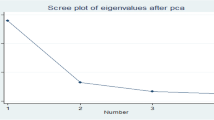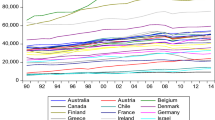Abstract
This study investigates the dynamic effects of the shadow economy and environmental pollution on the energy stock prices in the case of the Organization for Economic Co-operation and Development (OECD) countries via generalized methods of moments (GMM) and during the years from 2004 to 2014. Results suggest significant links between the volume of shadow economies, energy stock prices, and environmental pollution. Negative effects of carbon dioxide emissions on energy stock prices are found in this study. Furthermore, a U-shaped relationship is also found between the shadow economy and energy stock prices; that is the initial levels of the shadow economy the response of energy stock prices is negative; then, beyond a trough point, its response starts to be positive at the further stages of the level of shadow economies. Despite energy consumption raises energy stock prices, environmental pollution mitigates the value of energy stock prices.
Similar content being viewed by others
Data availability
Data used in this study will be provided upon request.
References
Abid M (2015) The close relationship between carbon informal economic growth and carbon emissions in Tunisia since 1980: the (ir)relevance of structural breaks. Sustain Cities Soc 15:11–21
Aloui C, Nguyen DK, Njeh H (2012) Assessing the impacts of oil price fluctuations on stock returns in emerging markets. Econ Model 29:2686–2695
Arellano M, Bond S (1991) Some tests of specification for panel data: Monte Carlo evidence and an application to employment equations. Rev Econ Stud 58(2):277–297
Arellano M, Bover O (1995) Another look at the instrumental variable estimation of error-components model. J Econ 68(1):29–51
Baksi S, Bose P (2010) Environmental regulation in the presence of an informal sector. Departmental working papers 2010–03, The University of Winnipeg, Department of Economics
Baloch MA, Danish, Meng F (2019) Modeling the non-linear relationship between financial development and energy consumption: statistical experience from OECD countries. Environ Sci Pollut Res 26:8838–8846. https://doi.org/10.1007/s11356-019-04317-9
Baloch MA, Danish, Khan SU-D, Ulucak ZŞ (2020a) Poverty and vulnerability of environmental degradation in Sub-Saharan African countries: what causes what? Struct Chang Econ Dyn 54:143–149. https://doi.org/10.1016/j.strueco.2020.04.007
Baloch MA, Danish, Khan SU-D, Ulucak ZŞ, Ahmad A (2020b) Analyzing the relationship between poverty, income inequality, and CO2 emission in Sub-Saharan African countries. Sci Total Environ 740:139867. https://doi.org/10.1016/j.scitotenv.2020.139867
Baum CF, Schaffer ME (2003) Instrumental variables and GMM: estimation and testing. Stata J 3(1):1–31
Bayar Y, Öztürk OF (2016) Financial development and shadow economy in European Union Transition Economies. Managing Global Transitions 14(2):157–173
Berdiev AN, Saunoris JW (2016) Financial development and the shadow economy: a panel VAR analysis. Econ Model 57:197–207
Blackburn K, Bose N, Capasso S (2012) Tax evasion, the underground economy and financial development. J Behav Organ 83:243–253
Blackman A (2000) An informal sector pollution control: what policy options do we have? World Dev 28(12):2067–2082
Blundell R, Bond S (1998) Initial conditions and moment restrictions in dynamic panel data models. J Econ 87(1):115–143
Bose N, Capasso S, Wurm M (2008) The impact of banking development on the size of shadow economy. Centre for studies in Economics and Finance, Working Paper No. 207
Bose N, Capasso S, Wurm MA (2012) The impact of banking development on the size of shadow economies. J Econ Stud 39(6):620–638
Bowsher CG (2002) On testing over identifying restrictions in dynamic panel data models. Econ Lett 77:211–220
Brouwers R, Schoubben F, Hulle CV, Uytbergen SV (2016) The initial impact of EU ETS verification events on stock prices. Energy Policy 94:138–149
Canh NP, Tahanh SD, Schinakus C, Bensemann J, Thanh LT (2019) Global emissions: a new contribution from the shadow economy. Int J Energy Econ Policy 9(3):320–337
Capasso S, Jappelli T (2013) Financial development and underground economy. J Dev Econ 101:167–178
Chaudhuri S, Mukhopadhyay U (2003) Pollution and informal sector: a theoretical analysis. Journal of Economic Integration 21:363–378. https://doi.org/10.11130/jei.2006.21.2.363
Chen H, Hao Y, Li J, Song X (2018) The impact of environmental regulation, shadow economy and corruption on environmental quality: theory and empirical evidence from China. J Clean Prod 195:200–214
Coban S, Topcu M (2013) The nexus between financial development and energy consumption in the EU: a dynamic panel data analysis. Energy Econ Int J Energy Econ Policy 3:2146–4553
Dabla-Norris E, Grandstein M, Inchauste G (2008) What causes firms to hide output? The determinants of informality. J Dev Econ 85:1–27
Elgin C, Uras B (2013) Public debt, sovereign default risk and shadow economy. Journal of Financial Stability 9(4):628–640
Elgin C, Oztunali O (2014) Pollution and informal economy. Econ Syst 38(3):333–349
Elgin C, Schneider F (2016) Shadow economies in OECD Countries: DGE vs. MIMIC approaches. Bogazici Journal 30:51–75. https://doi.org/10.21773/boun.30.1.3
Ersoy E, Ünlü U (2013) Energy consumption and stock market relationship. Int J Energy Econ Policy 3:34–40
Fethi MD, Fethi S, Katircioglu ST (2006) Estimating the size of the Cypriot underground economy a comparison with European experience. J Manpow 27(6):515–534
Filis G (2010) Macroeconomy, stock market and oil prices: do meaningful relationship exist among their cyclical fluctuations? Energy Econ 32:877–886
Georgiou MN. The impact of shadow economy on the stock market volatility. A Worldwide Panel Data Analysis (November 14, 2013). Available at SSRN: https://ssrn.com/abstract=2354369 or https://doi.org/10.2139/ssrn.2354369
Gobbi G, Zizza R (2007) Does the underground economy hold back financial deepening? Evidence from the Italian credit market. Bank of Italy, Working Paper No. 646
Gobbi G, Zizza R (2012) Does the underground economy hold back financial deepening? Economia Marche- J Appl Econ 31(1)
Greenwood J, Jovanovic B (1990) Financial development, growth, and the distribution of income. J Polit Econ 98(5):1076–1107
Greenwood J, Smith B (1997) Financial markets in development, and the development of financial markets. J Econ Dyn Control 21(1):145–181
Hadi MD, Katircioglu S, Adaoglu C (2019) The vulnerability of tourism firms’ to the terrorist incidents, current issues in tourism (in Press, https://doi.org/10.1080/13683500.2019.1592124))
Hassan M, Schineder F (2016) Size and development of shadow economics of 157 countries worldwide: updated new measures from 1999 to 2013. Discussion Paper Series No.10281
Ho SY (2018) Macroeconomic determinants of stock market development in South Africa. Int J Emerg Markets 14(2):322–342
Hsiao C (2014) Analysis of panel data, Cambridge university press, 2014
Imamoglu H, Katircioglu S, Payaslioglu CE (2018) Financial services spillover effects on informal economic activity. Serv Ind J 38(10–11):669–687
Kahouli B (2019) Does static and dynamic relationship between economic growth and energy consumption exist in OECD countries? Energy Rep 5:104–116
Kalayci S, Koksal C (2015) The relationship between China’s airway freight in terms of carbon-dioxide emission and export volume. Int J Econ Perspect 9(4):60–68
Kapusuzoglu A (2014) Causality relationships between carbon dioxide emissions and economic growth: results from a multi-country study. Int J Econ Perspect 8(2):5–15
Katircioglu S, Katircioglu S (2018) Testing the role of fiscal policy in the environmental degradation: the case of Turkey. Environ Sci Pollut Res 25(6):5616–5630
Katircioglu S, Alkhazaleh MMH, Katircioglu S (2018) Interactions between oil prices and financial sectors’ performances: empirical evidence from Amman Stock Exchange. Environ Sci Pollut Res 25:33702–33708
Katircioglu S, Abasiz T, Sezer S, Katircioglu S (2019) Interactions between volatility of the alternative energy input prices and spillover effects: a VAR [MA] - MGARCH in BEKK approach for the Turkish economy. Environ Sci Pollut Res 26(11):10738–10745
Li Z, Chen WT, Chang IC, Lee JM (2020) Analysis of stock market development and CO2 emissions on OECD countries via an empirical model. Clean – Soil, Air, Water 48:1900360. https://doi.org/10.1002/clen.201900360
Ma X, Fu Q (2020) The influence of financial development on energy consumption: worldwide evidence. Int J Environ Res Public Health 17:1–15
Markandya A, González-Eguino M, Escapa M (2013) From shadow to green: linking environmental fiscal reforms and the informal economy. Energy Econ 40(Supplement 1):S108–S118
Mazhar U, Elgin C (2013) Environmental regulation, pollution and informal economy. SBP Res Bull State Bank Pak Res Dev 9:62–81
Medina L, Schneider F (2018) Shadow economies around the world: new results for 158 countries over 1991-2015. IMF Working Paper No. 18/17
Memiş A, Kapusuzoglu A (2015) The impacts of global oil prices fluctuations on stock markets: an empirical analysis for OECD countries. Int J Econ Perspect 9(1):80–91
Mo JL, Zhu L, Fan Y (2012) The impact of the EU ETS on corporate value of European electricity corporations. Energy 45(1):3–11
Ngalawa H, Viegi N (2013) Interaction of formal and informal financial markets in quasi-emerging market economies. Econ Model 31:614–624
Nickell S (1981) Biases in dynamic models with fixed effects. Econometrica 49(6):1417–1426
Pesaran MH (2007) A simple panel unit root test in the presence of cross‐section dependence. J Appl Econom 22(2):265–312
Rahman M, Mustafa M (2017) Financial deepening and stock market returns: panel data analysis for selected developed and developing economies. Int J Econ Financ 10(1):96–109
Ray S (2012) Testing granger causal relationship between macroeconomic variables and stock price behavior: evidence from India. Adv Appl Econ Finance 3(1):470–481
Roodman D (2009) How to do- xtabond2: an introduction to difference and system GMM in Stata. Stata J 9(1):86–136
Sadorsky P (2010) The impact of financial development on energy consumption in emerging economies. Energy Policy 38(5):2528–2535
Sadorsky P (2011) Financial development and energy consumption in central and eastern European frontier economies. Energy Policy 3(2):999–1006
Schneider F (1986) Estimating the size of Danish economy using the currency demand approach: an attempt. Scand J Econ 88(4):643–668
Shaeri K, Adaoglu C, Katircioglu S (2016) Oil price risk exposure: a comparison of financial and non-financial subsectors. Energy 109:712–723
Svirydzenka K (2016) Introducing a new broad-based index of financial development. IMF Working Paper, WP 16/5
Tecel A, Katircioglu S, Taheri E, Bekun VF (2020) Causal interactions among tourism, foreign direct investment, domestic credits, and economic growth: evidence from selected mediterranean countries. Port Econ J 19:195–212
Williams CC (2011) Blurring the formal/informal economy divide: beyond a dual economies approach. Int J Econ Perspect 5(4):347–362
Zhang F, Fang H, Wang X (2018) Impact of carbon prices on corporate value: the case of the case of China’s thermal listed enterprises, sustainability, MDPI. Open Access J 10(9):1–14 September
Author information
Authors and Affiliations
Contributions
ZS constructed the Introduction section and estimated the results of models. The second author, SK, edited all sections and wrote results section. The third author, SK, constructed the research idea and research question, wrote conclusion section, and finalized editing the whole manuscript.
Corresponding author
Ethics declarations
Conflict of interest
The authors declare that they have no conflict of interest.
Ethics approval and consent to participate
Not applicable.
Consent for publication
Not applicable.
Additional information
Responsible editor: Eyup Dogan
Publisher’s note
Springer Nature remains neutral with regard to jurisdictional claims in published maps and institutional affiliations.
Rights and permissions
About this article
Cite this article
Şenhaz, Z., Katircioglu, S. & Katircioglu, S. Dynamic effects of shadow economy and environmental pollution on the energy stock prices: empirical evidence from OECD countries. Environ Sci Pollut Res 28, 8520–8529 (2021). https://doi.org/10.1007/s11356-020-11226-9
Received:
Accepted:
Published:
Issue Date:
DOI: https://doi.org/10.1007/s11356-020-11226-9




